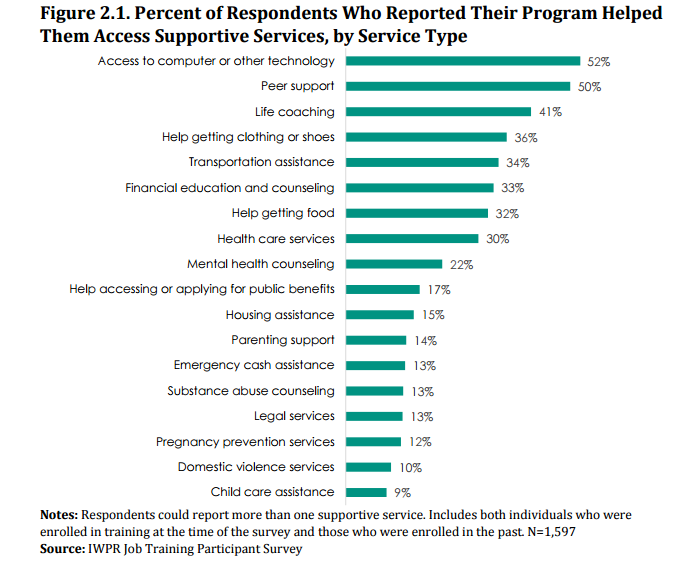IWPR recently released findings from a survey of nearly 2,000 job training participants. Below are some insights from the participants captured in the survey. Read the full report, Supports that Matter in Workforce Development Programs: A National Client Survey on Access to Services at iwpr.org and read the press release with key findings, “Groundbreaking Survey Finds Access to Services Like Child Care and Transportation Can Impact Success in Job Training Programs.”

Over half of participant respondents said their program helped them gain access to computers or other technology, and about half of respondents said their program helped them with peer support. Respondents had varied reasons for entering job training programs, one participant answered:
“I decided to enroll in job training because I wanted a better experience for life. I also wanted to see myself as a successful woman, without depending on anybody.”
Another said:
“[I wanted to enroll in job training] to show my child that if I can do anything, she can do anything. Plus, I want to prove to myself [that] I can do it.”
But many respondents face challenges during job training that may affect their success in the program. The most common challenges reported were difficulty paying bills and transportation problems.
Those who received supportive services report having better completion rates and stronger intentions of completion. Some pointed to greater financial stability, as one respondent noted:
“All the assistance I received from this program has been incredibly important in keeping me in my program. Without it, I have to make decisions like whether to pay for rent or food or pay for school fees.”

Others noted the importance of additional resources like peer support. One respondent said:
“The support that [the program] has given me is far more than I can give back. They are very important to me because they have stood by me and pushed me to better myself and shown me that I can do much more than I could have ever thought.”
And another respondent explained:
“When you are down and out the support from the other members and instructors means the world to you. It did to me and I thank God every day that I had a chance to go to the program and get the emotional support from these wonderful women.”
By continuing to build and strengthen partnerships, organizations can improve access to supportive services among job training participants. Other possible strategies for ensuring that participants’ needs are met include striving to increase supports that represent participants’ greatest unmet needs, including the experiences and viewpoints of program leaders in making the case for increased public funding for supportive services, and encouraging the use of funds from underutilized sources such as the Supplemental Nutrition Assistance Program Employment & Training for supportive services. If possible, programs should increase their support for child care through referrals or other means, and pilot new models for supporting the child care needs of mothers and fathers in training. Community colleges can work to develop partnerships with social service and other community-based organizations to strengthen their students’ access to supportive services.
To read the full report, visit iwpr.org.


